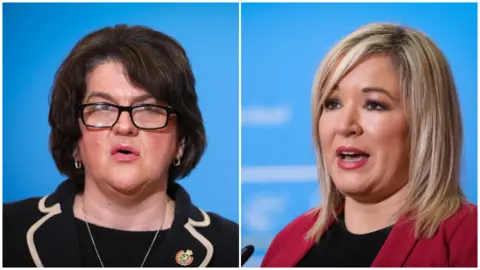Covid-19: Mixed message from Stormont over school return
 PA Media
PA MediaThis latest Stormont split over schools feels all too familiar.
On Thursday the executive said it had agreed a phased approach, even though DUP ministers had been advocating a quicker return.
Stormont's health officials advised that a gradual, staged process would be the best way of managing the spread of the virus.
But five days later and we are witnessing more friction over the issue within the executive.
First Minister Arlene Foster wants Stormont to revisit its schools strategy in light of Prime Minister Boris Johnson's decision to get all pupils in England back to classrooms on 8 March.
But Sinn Féin's Deputy First Minister Michelle O'Neill described the phased approach as "responsible".
There was some support on social media for Mrs Foster's comments but the DUP has also faced accusations of wanting to simply follow England's lead, as opposed to sticking to advice issued by Northern Ireland's health advisers.
There are other reasons why the DUP feels inclined to push again on this issue.
The plan agreed by Stormont on Thursday was not roundly welcomed, with some critical of the decision to bring a limited number of primary school pupils back for a short period before returning to remote learning for a week, while leaving other year groups to wait until after Easter before deciding when they might return to classrooms.
TUV leader Jim Allister called it a "hokey cokey" approach, a view shared by some DUP politicians who have since taken to Twitter calling for other executive parties to reconsider the plan.
Allow X content?
Allow X content?

The DUP may also have been listening carefully to the comments by England's chief medical officer Prof Chris Whitty on Monday, who pointed to the damage being done to students the longer they are not in class, and that data showed there was a "minimal risk" to children of contracting the virus.
It's not clear what officials in Stormont's Department of Health made of what Mrs Foster had to say or whether they'll now be inclined to speed things up.
For Sinn Fein's part, there doesn't yet appear to be a desire to move faster, with South Down MP Chris Hazzard critical of how the return of schools last September was managed.
Allow X content?

The party's chair of the Stormont health committee, Colm Gildernew, argued that the executive should be doing what "suits the situation" in Northern Ireland, as opposed to moving in lockstep with Great Britain.
Some teaching unions have said they want to ensure students can return quickly but it must be done safely and they remain hesitant about a full return next month.
Calls for teachers to be prioritised for the vaccine continue to get louder too.
 Getty Images
Getty ImagesSpecial schools in Northern Ireland have begun to be offered weekly testing but plans to introduce testing at secondary schools here, like in England, have yet to emerge.
The move to remote learning for most pupils after Christmas was the result of the number of coronavirus cases spiralling out of control in Northern Ireland, and executive ministers were fully aware of the pressures it would create for teachers, parents and pupils.
Alliance Party, SDLP and Ulster Unionist ministers on the executive will likely be concerned that tensions between the largest parties - the DUP and Sinn Féin - on schools could bubble over when ministers discuss their pathway-to-recovery blueprint on Thursday.
The make-up of Northern Ireland's five-party executive has repeatedly made it more complicated to tackle the pandemic.
How Stormont handles this developing row over schools will indicate what might come down the track with managing wider plans to exit lockdown.
That too could end up feeling familiar.
